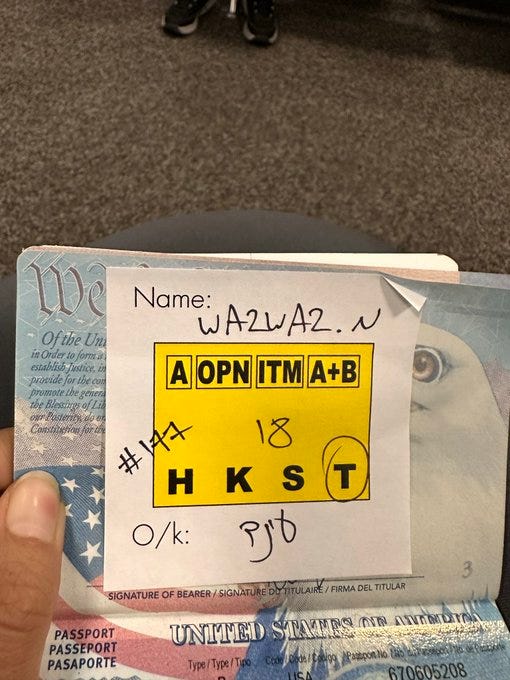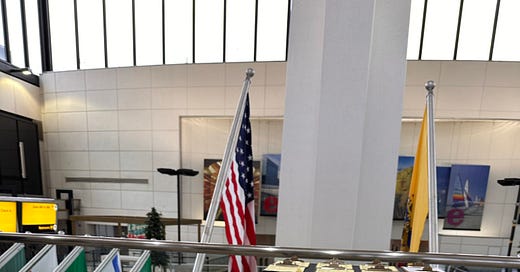The promise of travel often carries an unexpected burden for Palestinian Americans seeking to journey to their ancestral homeland. A disturbing narrative of racial profiling and systemic discrimination has woven itself into the fabric of their flights, transforming the skies into a theater of injustice.
The recent case of Palestinian American journalist Noor Wazwaz, chronicled through a series of poignant videos on her Twitter page, is not merely an isolated incident but a stark reminder of an entrenched pattern that demands an immediate reckoning.

The passage to Palestine, one etched with anticipation, family reunions, and cultural reconnection, has been tainted by a disheartening reality. Palestinian Americans, as they step into airports across the United States, find themselves unwitting participants in an unsettling drama of suspicion and humiliation. This narrative, regrettably indifferent to the changing seasons, beckons many to confront a disquieting question: How long will this insidious dance of intolerance persist?
Wazwaz's videos, a candid exposé of her experiences at Newark Liberty International Airport and Tel Aviv’s Ben Gurion Airport, lay bare the distressing reality that many Palestinian travelers face. From invasive body searches and dehumanizing interrogations to the confiscation of personal belongings, the story that unfolds is emblematic of a deeply troubling norm. Her compelling account casts a stark light on a journey that commences not with the excitement of adventure, but with the cloud of suspicion.
However, Noor Wazwaz’s tale is not an isolated incident. Enter Khalid A., a Palestinian American writer whose work frequently guides him to the heart of Palestine's narratives. Khalid's experiences mirror Wazwaz's, marked by recurring interrogations, invasive searches, and the unsettling suspicion cast upon his very being.
These trials, imposed upon him even before boarding U.S. flights and intensifying upon arrival and departure at Ben Gurion Airport, illustrate the breadth of this deeply rooted issue.
"Racial profiling and harassment know no borders; they haunt us from the moment we step into a U.S. airport to the second we depart an Israeli one," Khalid asserts. His unwavering voice captures the relentless reality faced by Palestinian American travelers.
The American-Arab Anti-Discrimination Committee (ADC) has unequivocally condemned the treatment Wazwaz endured.
In a conversation with Syropotamia, Abed Ayoub, National Executive Director of the ADC, spoke of the situation. "We have filed an official complaint with the United States Department of Transportation (DOT), urging an investigation into the El Al incident, in addition to requesting clarifications about the extent of the agreement between El Al and the U.S. government," he revealed. Despite his confidence in the Department's inquiry, Ayoub acknowledged that “the ADC is looking into all options to pursue this matter”.
As the spotlight turns to the conduct of Israeli security agents, further disconcerting details emerge. The sometimes 'foul play' observed in the handling of electronics such as laptops and mobile phones paints a troubling picture. Reports of 'accidental' reformatting of devices, the invasive scouring of personal data, and unwarranted suspicion have cast a troubling shadow over these journeys. This troubling facet underscores the broader narrative of bias that permeates these experiences.
Wazwaz's videos serve as more than just evidence - they underscore a pressing need for action against racial profiling and discrimination. The ADC's formal complaint gains momentum, casting a probing spotlight on El Al's practices and prompting questions about how this deeply rooted issue will be addressed.
The chronicles of Noor Wazwaz and Khalid A. resonate as beacons of change, illuminating a path towards equitable travel. In a world that aspires to embrace the diversity of the human experience, El Al's practices can no longer escape scrutiny or accountability, especially when exercised on U.S. soil. The stories of Noor, Khalid, and countless others demand not just acknowledgment, but tangible change. It is time for the skies to be free of prejudice, carrying travelers toward horizons where justice reigns supreme.





